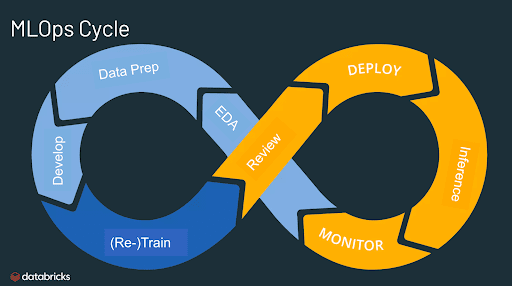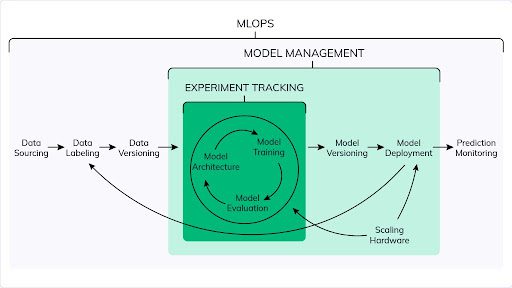
MLOps is referred to as Machine Learning Operations. The fundamental goal of Machine Learning Operations, or MLOps, is to streamline the procedure for bringing machine learning models into production. Moreover, it focuses on maintaining and monitoring them. Data scientists, DevOps engineers, and IT typically collaborate on MLOps projects as a team. Automation may be used to apply Machine Learning and Deep Learning models in large-scale production environments while also enhancing quality and optimizing the management procedure.
Gradually, Machine Learning Operations is becoming a stand-alone method for managing the ML cycle. It covers every stage of the lifecycle, including data collection, model building (using the software development lifecycle and continuous integration/continuous delivery), orchestration, deployment, health, diagnostics, governance, and business KPIs.
The key phases of Machine Learning Operations are:
- Data gathering
- Data analysis
- Data transformation/preparation
- Model training & development
- Model validation
- Model serving
- Model monitoring
- Model re-training.
Why does MLOps matter?
MLOps is crucial. Through developing more effective processes, utilizing data analytics for decision-making, and enhancing customer experience, machine learning enables people and organizations to implement solutions. These solutions uncover previously untapped streams of revenue, save time, and save costs.
Additionally, Machine Learning Operations act as a road map to help individuals, small teams, and even enterprises. It helps achieve their objectives despite obstacles like sensitive data, a lack of resources, a tight budget, etc.
Machine Learning Operations are practices, not rules, thus you may choose how big you want your map to be. For instance, you may try out various options and just keep what functions for you.
Why do we need Machine Learning Operations?
Machine learning is challenging to commercialize. Data input, data preparation, model training, model tuning, model deployment, model monitoring, explainability, and many other complicated elements make up the machine learning lifecycle. Additionally, it necessitates cross-team cooperation and handoffs from the Data Engineering, Data Science, and ML Engineering teams.
What are the benefits of MLOps?

MLOps’ main advantages are efficiency, scalability, and risk mitigation. Efficiency: For instance, Data teams can design models more quickly, offer higher-quality ML models, and deploy and produce models more quickly thanks to MLOps. Scalability: Machine Learning Operations also permit extremely large scaling and management, allowing for the continuous integration, continuous delivery, and continuous deployment of thousands of models. MLOps, in particular, makes ML pipelines reproducible, enables closer coordination between data teams, lessens friction with DevOps and IT, and speeds up release velocity.

